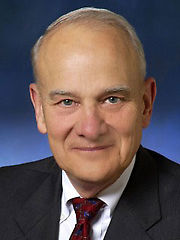ACM Policy Award
USA - 2017
citation
For broad contributions bringing computing into the national agenda, leading computer scientists into public policy where his inspirational leadership promoted key national priorities including diversity and ethics.
Bill Wulf is a remarkable pioneer in bringing computing issues and professionals into national agenda discussions. His advocacy of national priorities such as engineering ethics, education, diversity, and infrastructure, is manifest in his writings and support for major reports, such as "Rising About the Gathering Storm" and "Educating the Engineer of 2020." He was a strong and fiercely dedicated proponent of building research centers offering shared resources that promote collegial interactions and joint research. These greatly contributed to the establishment of academic supercomputer centers.
Bill Wulf's most well-known impact is the part that he played in allowing the Internet to expand beyond government borders. His efforts while Director of the NSF-CISE Directorate contributed to a major federal policy change enacted through Congress: this change allowed public access to the then NSFNet. The role that he played places Bill among a very small, distinguished group of people that made significant, core contributions to the creation of the modern internet. Bill Wulf's policy mentorship also resulted in his conducting a workshop on "The Impact of Technology On Voting and Elections in the 21st Century".
Bill accomplished this in part through his inspirational leadership of key policy organizations. He served as Director of the U.S. National Science Foundation's Division of Computer and Information Science and Engineering (NSF-CISE, 1988-1990), chair of the National Research Council's Computer Science and Telecommunications Board (1991-1996), and as President of the National Academy of Engineering (1996-2007).
From his early research contributions in programming languages and systems to his long-term devotion to leadership positions, Bill Wulf's breadth of interests, engagement with colleagues and students, and commitment to values-based advocacy exemplifies excellence as a computing professional.
ACM Karl V. Karlstrom Outstanding Educator Award
USA - 2014
citation
For contributions as a teacher, author, and national leader who focused attention and changed the national education agenda and in the process supported the needs of underserved and under-represented students.
ACM Distinguished Service Award
USA - 2011
citation
For distinguished service to the computing and the engineering communities as Assistant Director of NSF's CISE Directorate (1988-1990) and as President of the US National Academy of Engineering (1997-2007).
Professor William A. Wulf (Bill Wulf) has made extraordinary contributions to both the computing and engineering research communities as well as to education and public policy. He is the only computer scientist to have served in both of the most important and visible national leadership positions in computing and engineering in the United States: as Assistant Director (AD) of NSF's Computer and Information Science & Engineering (CISE) Directorate from 1988 to 1990 and as President of the US National Academy of Engineering (NAE) from 1997 to 2007.
Professor Wulf's time as AD of CISE was marked by his great understanding of the role NSF played in supporting science and engineering in the United States. As a "young" Directorate (CISE was created in 1986), he led the alignment of the missions and domains of the CISE and the Engineering Directorates - a difficult subject that was helped by his keen understanding of these two domains. This was an important period for CISE, for not only was it responsible for funding basic research in computer science and engineering in the US, but also for operating a half-dozen supercomputer centers and NREN (aka NSFNet). A highlight of his tenure at NSF was overseeing the merger and conversion of ARPANet with/to NREN, a critical step that eventually evolved into a network accessible to and usable by all - the Internet.
Professor Wulf has also been widely recognized for his leadership in engineering and for his advocacy of engineering education and technical literacy while president of the NAE. He established the NAE standing committee on engineering education which produced the influential reports The Engineer of 2020: Visions of Engineering in the New Century and Educating the Engineer of 2020: Adapting Engineering Education to the New Century. He conceived of and promoted NAE's tech literacy movement including a seminal report that made the case for technical literacy, Technically Speaking: Why All Americans Need to Know More About Technology. This in turn led to NAE's efforts to understand the role and potential for teaching engineering concepts at the K-12 level. He also created the Center on Engineering, Ethics and Society (CEES) in NAE to discuss the importance of ethics in the profound impact of engineering on our society.
Professor Wulf's distinguished service and leadership, at both the NSF and the NAE, has helped to shape the future for computer and engineering practitioners, researchers, educators and public policy makers.

